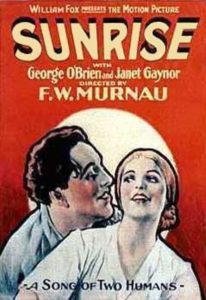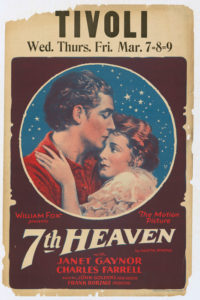 Another silent film from 1927, Sunrise: A Song of Two Humans is directed by F.W. Murnau and starred George O’Brien and Janet Gaynor. It was adapted from the short story “The Excursion to Tilsit” by Carl Mayer and went on to win two of the first Academy Awards, both Best Actress and Best Cinematography. At this point, I’m beginning to think of Janet Gaynor as my 1920s bae.
Another silent film from 1927, Sunrise: A Song of Two Humans is directed by F.W. Murnau and starred George O’Brien and Janet Gaynor. It was adapted from the short story “The Excursion to Tilsit” by Carl Mayer and went on to win two of the first Academy Awards, both Best Actress and Best Cinematography. At this point, I’m beginning to think of Janet Gaynor as my 1920s bae.
Sunrise: A Song of Two Humans
Luckily for me, Sunrise was also available on YouTube which I noticed after it appeared on my “Recommended for you” videos. I was initially worried since I remember reading that the film’s negatives were destroyed in a fire and that it might be one of those “lost” films, but luckily someone was able to make a copy for the masses to enjoy. It was a lazy Sunday afternoon when I began this movie about a sordid affair between a married farmer, The Man, and a floozy, The Woman from the City.
Right away, I was stunned with how hot George O’Brien was- A touch of Ryan Gosling mixed with Chris Evans. His character lacked any sort of spine and had zero concern for his wife, but his trysts with a pretty flapper from the city on vacation were saucy, and it wasn’t long until she pleaded with him to go back with her. While he objects because he has a wife, Margaret Livingston’s lustful city girl demeanor gets dark as she encourages The Man to kill his wife. “Just take her out for a boat ride and throw her over,” she coos at him. The Man’s faces are perfection during this scene, as are the dialogue cards while he struggles with what do. Cue the perfect, delicate flower that is Janet Gaynor as she agrees to a boat ride with the husband she loves dearly while the town’s old maids gossip about how unhappy their marriage is. Surely this is a chance for them to reconnect! Her happiness is beyond infectious as she all but skips to meet her husband for their daylight boat ride, but it’s not long as she realizes something is afoot. The acting is just phenomenal as The Man’s inner struggle comes to a head and he cannot bring himself to toss out his dear wife.
While F.W. Murnau’s sets aren’t particularly laden with details, his direction, especially with the lighting details, adds much to the atmosphere between characters. It’s also worth it to note this is the first time where the camera is in motion during a film, and at times it’s shaky, but a different touch from “7th Heaven.” The moviefone score was perfect. It crescendos at the most romantic of moments between our main characters, and added a blissfully sinister overtone to the early interactions between The Man and The Wife.
While I felt every second of the movie, my favorite scene is where The Man takes The Wife and kisses her good and well. It’s a dizzying, beautiful kiss, as they cause traffic jams, scenery to change, and it’s like the whole span of their love exists in just those few moments. It’s a fucking beautiful piece of film.
Sunrise: A Song of Two Humans was enjoyable, but as the pacing felt slow in places, I’m not sure it’s one I’d watch again. You can definitely find the film on Amazon or at your local video store!
SCreenings is a series of movie diaries from our staff, currently being monopolized for the daunting task of watching every Oscar nominee by one of our editors
 Initially released in 1927 as a silent film based on a play, “7th Heaven” was among the nominees for the first ever Academy Awards for Best Picture. While it didn’t win, it made it’s mark on cinematic history. Starring Janet Gaynor and Charles Farrell, who went on to become America’s Lovebirds, and directed by Frank Borzage, the film did score awards for Best Director, Best Actress, and Best Writing.
Initially released in 1927 as a silent film based on a play, “7th Heaven” was among the nominees for the first ever Academy Awards for Best Picture. While it didn’t win, it made it’s mark on cinematic history. Starring Janet Gaynor and Charles Farrell, who went on to become America’s Lovebirds, and directed by Frank Borzage, the film did score awards for Best Director, Best Actress, and Best Writing.
7th Heaven
I should begin by saying the only silent film I can remember seeing is “Nosferatu,” which renders my expertise in this genre of movie completely nonexistent. I had no idea what to expect from a vintage story at 1:00 AM on a Monday, but as someone who enjoys the experience of a movie, I can say with certainty that there is a certain kind of magic here.
I watched Janet Gaynor’s petite and classically beautiful Diane live a miserable life at the hands of her abusive sister only to be left for dead when the devastatingly handsome Chico, played by Charles Farrell, intervenes. Like seriously, if you had told me I would be lusting for a man who has long since left this world, whose very existence I JUST learned about…well, I’d probably believe you! His tussled hair and strong face probably set many hearts aflame in the twenties! I’m assuming Diane and her bitch sister were “ladies of the evening,” based solely on a couple of vague context clues. Honestly, I’m unsure where they found money to live if they weren’t selling themselves in 1920’s era Paris. Either way, the slow buildup between Diane and Chico was touching, and the ending devastating, demonstrated by the large amounts of tissues I filled with the tears of my ugly sobs. My expectations were low, and to say this movie went above and beyond is an understatement.
Diane’s development from a timid waif to a strong willed person in charge of her own destiny was beautiful, and I found it very interesting that she was the one who inspired Chico to be okay with his feelings, and she was the one providing the backbone to this couple. Gaynor’s range of emotion for Diane is really something to behold. I genuinely can’t wait to see more of her acting. Chico also undergoes a character transformation. His first appearance shows him to be haughty, and proud of his disbelief in “Bon Dieu,” much to the chagrin of the local priest, but with a yearning to be more than a lowly sewer cleaner. It’s only through his relationship with Diane that he sees that there could be more to life than a bitter disregard for everything.
I am pretty sure there are a couple other Frank Borzage directed movies on my list, and if his eye for storytelling remains just as wonderfully paced and framed, I’m really in for a treat. My favorite, favorite scene has to be where Chico leads Diane up seven flights of stairs to his heaven, a rooftop apartment. Borzage’s set allowed the vertical use of a camera in order to shoot the ascension of the stairways in one take and it made such an impression on me. It was romance at its finest as Chico shows Diane the view, delivering an iconic line:
“I work in a sewer but I live near the stars.”
I would absolutely watch this movie again, if just to dream about star crossed lovers. I found the movie on YouTube, but it’s also available on DVD, unless you wanna spring for an expensive ass box set with a bunch of 1920’s films on it!
SCreenings is a series of movie diaries from our staff, currently being monopolized for the daunting task of watching every Oscar nominee by one of our editors










